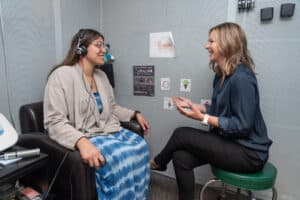Effective Solutions for Hearing Loss
Routine hearing screening is now recommended for everyone over the age of 50.
Hearing loss can have several negative impacts on a person’s health and well-being. It can lead to social isolation, communication difficulties, decreased quality of life, and even psychological issues such as depression and anxiety.
Additionally, untreated hearing loss has been associated with cognitive decline and an increased risk of dementia. Studies have suggested that the brain’s ability to process sound may be compromised when hearing loss goes untreated, potentially leading to accelerated cognitive decline.
Hearing Loss Facts and Figures:
- Approximately 466 million people worldwide have disabling hearing loss, as reported by the World Health Organization.
- In the United States, around 15% of adults report hearing loss.
- Age is a significant factor, with one in three people over 65 experiencing hearing problems.
- Noise-induced hearing loss is a significant concern, with around 1.1 billion young individuals at risk due to exposure to high noise levels.
- Communication barriers resulting from hearing loss can lead to social isolation, lower educational attainment, and reduced employment opportunities.
How We Hear:
- The process of hearing involves several steps. Sound waves are collected by the outer ear (pinna) and directed into the ear canal.
- Sound waves enter the ear, reaching the eardrum and causing it to vibrate.
- The vibrations are transmitted through the three tiny bones in the middle ear: the anvil (incus), the hammer (malleus), and the stirrup (stapes).
- The stirrup bone passes the vibrations to the fluid-filled cochlea in the inner ear.
- Within the cochlea are tiny hair cells that convert this mechanical energy into electrical signals. These signals are then transmitted along the auditory nerve to the brain, which interprets them as sound.
Types of Hearing Loss:
Conductive Hearing Loss
Conductive hearing loss occurs when sound waves cannot efficiently pass through the outer or middle ear due to blockages, infections, or malformations. Conductive hearing loss is caused by problems in the outer or middle ear that prevent sound from being conducted properly to the inner ear. It can result from ear infections, tumors, impacted earwax, or structural abnormalities like a perforated eardrum. Individuals with this type of loss might experience a reduction in sound level or difficulty hearing faint sounds. Luckily, conductive hearing loss is often treatable with medication or surgery.
Sensorineural Hearing Loss
Sensorineural hearing loss occurs due to damage to the inner ear or the neural pathways that carry sound to the brain. It’s often caused by aging, exposure to loud noise, genetics, or diseases like meningitis. Individuals with SNHL may find it hard to hear soft sounds and perceive louder sounds as muffled. Sadly, this type of hearing loss is typically permanent as the damage to hair cells or nerves is irreversible.
Mixed Hearing Loss
Mixed hearing loss is a combination of sensorineural and conductive hearing loss, meaning that problems exist in both the inner and outer or middle ear. This could occur if someone with age-related sensorineural hearing loss also developed an ear infection, for instance. The treatment approach for mixed hearing loss depends on the underlying causes and may involve a mix of medical interventions, surgery and hearing aids.
Sudden Hearing Loss
A sudden and unexplained reduction in hearing that occurs in one ear over a span of just a few hours or days, is considered a medical emergency and should be promptly evaluated by a healthcare professional, when possible an ear, nose, and throat specialist. Sudden hearing loss can be caused by a condition known as sudden sensorineural hearing loss (SSNHL). The exact cause of SSNHL is not always clear, but it may be linked to viral infections, vascular issues, autoimmune diseases, or trauma. Early diagnosis and intervention with treatments like corticosteroids or antiviral medications can improve the chances of hearing recovery, although outcomes vary, making swift medical evaluation crucial in addressing this condition.
Causes of Hearing Loss:
- Aging is the most common cause of hearing loss, known as presbycusis. It typically involves a gradual loss of hearing due to changes in the inner ear.
- Exposure to loud noises, such as prolonged exposure to loud music, occupational noise, or explosions, can lead to noise-induced hearing loss.
- Certain medical conditions, such as otosclerosis, Meniere’s disease, and infections like otitis media, can contribute to hearing loss.
- Genetic factors, head trauma, certain medications (ototoxic drugs), and tumors can also cause hearing loss.
Signs You Might Have Hearing Loss:
- Difficulty understanding speech, particularly in noisy environments.
- Frequently asking people to repeat themselves.
- Struggling to hear high-pitched sounds, such as doorbells or telephone rings.
- Turning up the volume of the radio or television to excessive levels.
- Feeling that others are mumbling or speaking unclearly.
Consequences of Hearing Loss:
- Communication difficulties lead to social isolation, strained relationships, and feelings of frustration or depression.
- Reduced job performance and employment opportunities due to difficulties in understanding instructions and participating in conversations.
- Increased risk of accidents and safety concerns, as hearing loss can impede one’s ability to detect warning signals or environmental cues.
- Cognitive decline and increased risk of dementia, as hearing loss can negatively impact cognitive function and brain health.
Benefits of Hearing Aids:
- Improved communication and speech understanding allow individuals with hearing loss to actively engage in conversations and social interactions.
- Hearing aids can significantly improve the quality of life for those with hearing loss by reducing feelings of isolation, depression, and anxiety.
- Increased safety and awareness of the environment, as hearing aids help individuals hear essential sounds like alarms, traffic signals, and doorbells.
- Better job performance and professional opportunities, as hearing aids enable effective communication in the workplace.
- Preservation of cognitive abilities by stimulating the brain’s auditory pathways and reducing the risk of cognitive decline associated with untreated hearing loss.
Read more about Hearing Aids on our Hearing Aids Page
Frequently Asked Questions About Hearing Loss
Contact Us Today!
At Boulder Valley Ear, Nose & Throat Associates, we provide the highest quality patient care in a friendly, professional atmosphere. We emphasize personalized customer service, availability, efficiency, honesty and integrity, and attention to detail. We strive to do things the right way at every level, all the time.
If you think you may have some degree of hearing loss, schedule an appointment with one of our caring and experienced ENT specialists for a full evaluation today!










